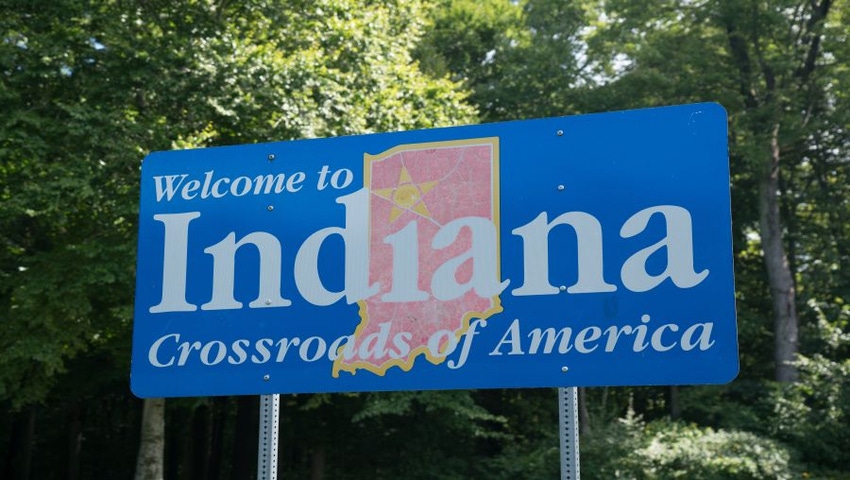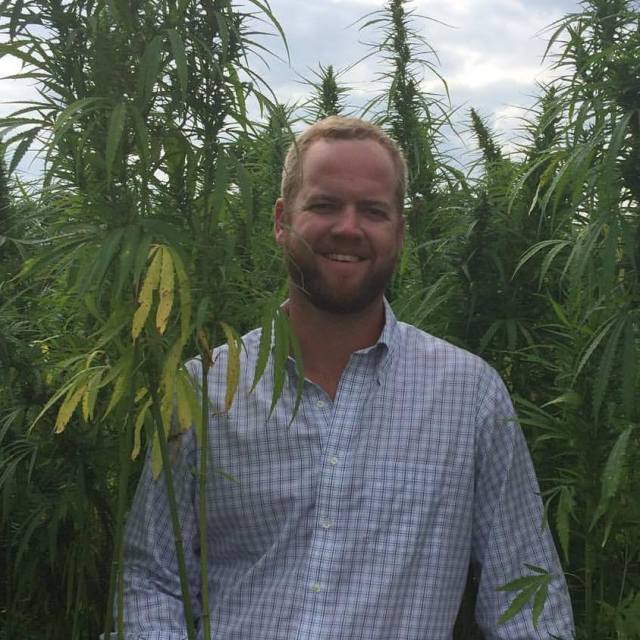A law in Indiana could serve as a model for other states that want to make CBD widely available to consumers, while protecting the public from shoddy products.

“Panic.”
Josh Hendrix used the term to describe a common reaction to the 2017 seizure of CBD (cannabidiol) products from Fresh Thyme, a health foods store, by excise police in Indiana.
“So obviously, their [Fresh Thyme’s] corporate folks were calling in panic,” he reflected during a recent interview. “My boss was calling in panic.”
“I said … ‘It’s going to be fine,’ Hendrix continued. ‘We’ve had this happen before. Once we talk to these police officers and explain to them this is hemp … we should be alright.’”
Then, a local news station broadcast a story about the raid, displaying a picture of PlusCBD Oil, the brand distributed by Las Vegas-based CV Sciences Inc., Hendrix’ employer.
“Now Fresh Thyme’s really freaking out because it shows a picture of their store,” observed Hendrix, director of business development—domestic production for CV Sciences. “My boss is really freaking out, and I’m actually fist-pumping across my living room … because I know when we fix this issue, we’re going to sell more CBD than we ever thought about selling in Indiana.”

Josh Hendrix of CV Sciences
One year after the raids, CV Sciences is gearing up to comply with new labeling requirements in Indiana following legalization of CBD, or so-called hemp extracts low in THC (delta-9-tetrahydrocannabinol)—the psychoactive compound found in marijuana responsible for getting people high.
The new disclosures could serve as a model for other states that want to make CBD widely available to consumers, while protecting the public from shoddy products.
In March, Gov. Eric Holcomb signed Senate Bill 52, which legalized hemp extracts containing no more than 0.3 percent THC. Effective July 1, 2018, “low THC hemp extract(s)” must be distributed in packaging that includes a “scannable bar code or QR code linked to a document” disclosing various information, including the manufacturer of the finished product.
Among other requirements, the QR code must include a download link for a CoA (certificate of analysis), verifying the hemp extract is the product of a batch tested by an independent lab and contained no more than 0.3 percent THC.
The state law clarifies “hemp-derived CBD is not a controlled substance,” said Jonathan Miller, general counsel to the U.S. Hemp Roundtable, a coalition of hemp companies.
State Sen. R. Michael Young, a Republican who Miller said wanted the safeguards in SB 52, didn’t respond to a request for an interview.
“There is still concern among some people that, ‘OK, it says it’s a CBD product, but what’s really in it?’” Miller explained. “Is there marijuana in it or … is there no CBD?”
Young’s idea is the bill’s “requirements will help demonstrate that products being sold are legitimate, hemp-derived CBD,” added Miller, a member of the law firm Frost Brown Todd LLC in Lexington, Kentucky.
Indiana’s law is “just going to keep the industry as a whole a lot more accountable,” remarked Michael Mona III, co-founder, chief operating officer and president of CV Sciences, in a phone interview. “It’s going to separate the players who want to be here in the long term versus groups that are jumping in it right now because they see the growth and want to make a quick buck.”
CV Sciences intends to meet Indiana’s labeling requirements by the July 1, 2018 deadline and roll out new labels with QR codes on all its products across the United States by mid-August or September, he said.
CV Sciences is hopeful other states passing CBD laws will adopt the model in Indiana, or a similar one, so companies won’t have to make different labels—and various disclosures—across the country.

CV Sciences' Michael Mona III
“Could you imagine having the same one-ounce … peppermint drops with 12 different labels for 12 different states?” Mona asked.
From the hemp industry’s standpoint, SB 52 is mostly positive.
Mona described the requirement to disclose the name of the product manufacturer as a “double-edged sword.”
“Competition can now know who we use for manufacturing,” he said. On the other hand, Mona said the requirement gives consumers “peace of mind” that products are being made by reputable companies.
But, complying with every single aspect of Indiana’s law could prove challenging based on the contractual relationships between distributors like CV Sciences and contract manufacturers of finished products. Among other requirements in the law, the QR code must link to a document disclosing the ingredients used and the name of the ingredient manufacturer.
CV Sciences can’t reveal, for example, the ingredient supplier of its peppermint flavoring because such information is protected under a non-disclosure agreement with the product manufacturer, Mona explained. CV Sciences will explain why it can’t disclose such information, Mona said, adding his company audits all its manufacturers before using them and can access proprietary information on-site if necessary.
“And if a problem ever arises, we can trace it back to the exact batch number of the ingredient from the manufacturer,” he said.
Commenting on SB 52, Mona concluded Indiana lawmakers want companies to be transparent, “and we have no issues with that whatsoever.”
Asked whether the law would increase consumer confidence, he responded, “1,000 percent.”
Jessica Scott is executive director of the Indiana Hemp Industries Association (HIA). She said she’s not aware of any concerns in meeting the July 1, 2018 deadline.
“The industry will adjust” to the new requirements, Miller said. “There may be efforts in the next legislature to provide clarification or simplification, but everybody I’ve talked to is going to be able to comply with those added regulations.”
Scott said she was “thrilled” the law included regulatory safeguards.
“[L]ack of regulation within the industry allows bad players to have a place on shelves, and the solution isn’t to allow nobody to be on the shelves,” she said in a phone interview. “The solution is to have good regulatory language in your legislation, and that’s exactly what Indiana did.”
SB 52 was passed in the wake of a series of 2017 raids. As reported by The Indianapolis Star, excise police confiscated more than 3,000 products at 57 stores over a period of five weeks. While an Indiana law passed in 2017 had allowed individuals diagnosed with treatment-resistant epilepsy to possess CBD, excise police believed the law clarified possession of CBD for other purposes was a crime, the newspaper explained.
Retailers didn’t all concede they were violating the law. For instance, a store clerk at Fresh Thyme in Greenwood, Indiana advised officers they were “wrong” concerning the illegality of the products, The Indianapolis Star reported, citing an incident report. Fresh Thyme declined INSIDER’s request for an interview.
“It didn’t seem like they really knew what they were looking for,” Jeff Shelton, one of the owners of Happy Daze Smoke Shop, whose products also were confiscated, said in the newspaper article, commenting on excise officers. “They weren’t very knowledgeable about CBD at all. They didn’t know what the current laws were.”
The controversy over the seizures led to the issuance of a legal opinion by Indiana Attorney General Curtis Hill, who opined CBD remained unlawful in The Hoosier State and under federal law.
“Simply put, cannabidiol is a Schedule I controlled substance because marijuana (Cannabis sativa) is a Schedule I controlled substance,” he wrote in a Nov. 21, 2017 executive summary. “Although it is a relatively new phenomenon, after thoroughly tracking the language of the Indiana law defining ‘marijuana,’ it is evident that cannabidiol is now and historically has been derived from ‘a part of the plant genus Cannabis.’”
Absent a narrow exception for possession and use of CBD by caregivers and patients battling certain types of epilepsy, “substances containing cannabidiol are Schedule I controlled substances, and if identified or so labeled in plain view of a law enforcement officer, are subject to seizure,” Hill determined.
A week after Hill’s legal opinion was published, Indiana’s governor—Holcomb—directed excise police “to perform normal, periodic regulatory spot checks of CBD oil products, focusing on those products which contain any level of THC.” However, he imposed a 60-day moratorium on law enforcement activities to give retailers time to remove THC-containing products from their stores.
The media publicity generated from the seizures created a surge in demand for CBD at Adele’s Naturally in Evansville, Indiana, a retailer selling vitamins, minerals and supplements, noted store manager Jordan Fink. What’s more, the legal opinion by Hill, the governor’s 2017 statement and Holcomb’s signing of SB 52 all fueled an explosion in sales of CBD, he added in a phone interview.
“This fear and this ambiguity actually helped,” Hendrix said, commenting on sales of CBD in Indiana, “because people were running to the store, buying more products, really causing this disruption and speaking up and saying, ‘We want this.’”
Adele’s Naturally carries PlusCBD Oil and a brand distributed by Santa Monica, California-based Sagely Naturals, which did not respond to a request for an interview.
Consumers interested in CBD often come into the store looking to relieve pain and get help with anxiety, mood and stress, Fink explained.
What do customers share about their use of CBD? “We hear the word ‘miracle’ a lot,” he said. “Really, with anything, we try not to oversell it to anybody, particularly first-time people in here.”
“I tell people, ‘If we’re talking pain relief, you know, if we can take somebody from a nine to a six, that’s life-changing,’” Fink continued. “We’ve had people [who] are coming off … three different prescription pain killers. We’ve had people coming off … things like Xanax.”
He acknowledged CBD hasn’t worked for everyone. “Everyone just seems to be getting positive results or no results at all,” Fink said, adding some people are allergic to the hemp plant.
CBD appears to be “actually working for people,” Scott of the Indiana HIA said, “and it’s changing their lives.”
“With that said, there’s some people who take CBD and they don’t feel like anything happened,” she recognized. “And that’s fine. I think it’s helped enough people that it is worth a try, and I think that’s how we became this state that’s selling so much of it.”
Indiana has been especially good for business for CV Sciences. Hendrix said The Hoosier State shot up to CV Sciences’ top-selling state last year—surpassing California—after ranking sixth or seventh in the nation. In 2017, CV Sciences reported total sales of US$20.7 million, an increase of 87 percent over the previous year ($11.1 million)
“What I tell people is when you know you’re on the right side of history, it’s easier to be as bullish about something as I am on CBD,” Hendrix said.
There’s more work to be done. The hemp industry is looking to make CBD accessible in other states, including conservative ones like Iowa—home to U.S. Sen. Chuck Grassley, a senior Republican who chairs the Senate Judiciary Committee.
“We’re going to need this to happen over and over … again—state by state,” Hendrix said, “and people are going to need to say, ‘Hey, this is silly. This [CBD] is non-intoxicating, non-harmful and very helpful for that matter, and we want it to be available on retail store shelves.’ Then, you can get the movement going.”
About the Author(s)
You May Also Like






.png?width=800&auto=webp&quality=80&disable=upscale)